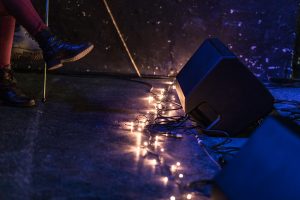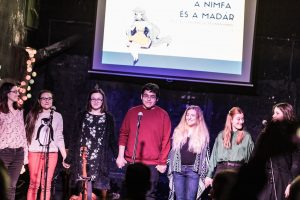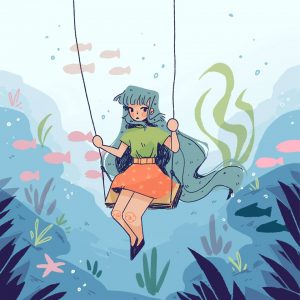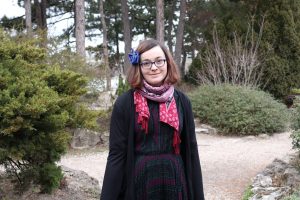1. How would you describe your music in three words?
2. Since when is music a part of your life? How did you find this pleasant, kawaii branch of electronic music?
I’ve been playing instruments since I was a child. (I play the piano, the guitar and the double bass. If I remember well, I’ve been writing songs since I was 14. I stopped for a few years when I was around 18 and started writing songs again about three years ago. Of course I kept playing instruments during all this time. I write songs in many genres, but the one I might be most known for is a genre called “kawaii future bass.” It’s a predominantly Japanese/Asian genre that is often linked to the anime-subculture. I first discovered it at Snail’s House and started to listen to it more. It was a somewhat conscious decision on my part that I began publishing music in this genre because I saw that it was quite popular online. When I started writing electronic music I couldn’t really fit my songs in any genre and I felt that it might become a disadvantage when I start to publish. Therefore I tried to consciously shape my songs so that they would fit into a genre. I made my debut with kawaii songs, but I also write in other genres. I like chill songs as well and we have done some bedroom pop songs with my boyfriend.
3. Have you ever learned composition at school or did you learn it by yourself?
I learnt classical music composition for 6 years. This course was based on solfege and the knowledge of playing an instrument. Here I had the opportunity to work on my own songs and I learned what the rules of making a melody for a chord progression are or how to make a chord progression for an already existing melody. I learned the register and the function of every instrument in classical music. I started to learn electronic music in Budapest, in a music production school in February 2018 where I attended a music producer course. I learned mixing, mastering, sound design and arrangement for six months. I think it was very memorable and useful to attend this course. If you want to make music, you must know all the rules and in electronic music it is inevitable to understand the technical side as well. It’s possible to learn the basics from YouTube tutorials but there are a lot of incorrect information and bad tutorials out there. I feel it was so much easier to go to the music production course and get all the knowledge in half a year. Otherwise I might have spent 5 years experimenting and learning to get to the same level where I was after the course.
4. What is the best advice that you got so far?
I can’t really choose one single advice about music, so I will mention a more personal advice: you shouldn’t care about what music others make or what the audience expects to hear. You can build an audience for any (good) musical style on the internet. You don’t have to do things that everybody else does, but you must understand what you are good at and find the audience who wants to hear exactly that.
5. What is the easiest and the most difficult side of music composition (in the 21st century)?
I think the easiest thing is that there is so much available information on the Internet and there are many courses. There are no secrets anymore. The most difficult aspect is patience. You can’t learn to make good songs in one day, the same way you can’t be successful or develop a fanbase in one day. I’ve heard from many people that you need at least 10 years to learn a profession well and to develop your musical brand. I’m only at the beginning of this journey.
6. How long does it take to make a song? Where do you get your influence from? Can you talk a little about the process?
I think I work relatively fast. I make all my songs in a DAW software. If I make a song alone, it usually takes 1 or 2 days. If I need to record something for it, I usually record it in another day. If I’m making a song with somebody else, I have to fit my working process with the other person. For example, there is a song called Fluffy Pipi that I made with my boyfriend. We had the original idea of the song around May 2019. He started to work on the song, but after some time we forgot about it. He eventually finished the instrumental part sometime in the autumn and I recorded the final vocals. This took us half a year.
There is also an EP called Backpack we are making together, but 4 other vocalists are involved in it as well. We started this project around May too and all the instrumentals were done by September, but we are still waiting for 3 vocalists to finish their parts. I stopped working on the instrumentals because I wasn’t in the mood any more for these songs. If they requested any changes, I wouldn’t do it. That phase had been closed in my mind and I’m thinking about other projects already. John, on the other hand, said that he would work some more on the songs if it was necessary. Everybody is different. I think finishing this four-song EP will take around a year.
7. What did your environment think when you started to take musical composition more seriously?
My family and my friends all knew that I play and write music and they’ve always supported me. My grandfather used to say that when I graduate from university, I should go and study piano at the music academy. I already graduated, but I still haven’t started to study piano at university level. I think this isn’t the direction that would serve my goals the best.
Electronic music was always a little strange for my environment since the musical genre that I make (mostly kawaii music) is not really known in Hungary, and I think only younger people have heard about it, mainly in connection with anime. It’s different from how, for example, hip-hop is part of the underground culture of the United States or how guitar pop is popular in Hungary. It’s something out-of-the-box here. I feel like people are starting to get used to it because they hear it more frequently and they don’t think anymore that I make some very strange music. But they often tell me that it’s still not their genre of choice. They just listen to it once and that’s enough. They never get back to it again because it’s not their style. I don’t get too much support here.
However, on the other side of the world it’s different. I often see people who listen to my songs on repeat from the United States or from Asia. For example my song, Space Bunny Girl! reached 49.000 plays in roughly a month since it got uploaded to a well-known Youtube anime channel.
8. Personally I hate if artists are bombarded with financial questions… but there must be many people who are interested in this: is musical composition only a free time activity for you, or can it be a source of income, or is it possible to even make a living from it?
I started making music as a free time activity, but it slowly started to become something more. I still have what others call a day job and I make music on the side. I like to define myself as a “lifestyle entrepreneur” (I’m a freelancer, working on my laptop and I travel a lot). I made the decision recently that I want to take music more seriously because I’m more interested in it than in a free time activity, and I’m putting more and more time in it. I’d like to structure my life in a way that I can have some income from music and other projects don’t push it to the background.
I think it’s good to talk about art from a financial aspect. It’s hard to make money with music, but it isn’t impossible. Musicians can get money for their songs in different ways. For instance, my music is available on the streaming services (Spotify, Apple Music etc.) and I get money after the plays. It’s not a lot, and it’s definitely not enough to make a living. There are also people from time to time who purchase my music on Bandcamp, and they get the music as a free digital download. My plan for February is to sell some merchandise, for example, to make tote bags from Emma Krausz’s drawing that I used for my song Space Bunny Girl!
I’m releasing more and more songs where I sing, and I’m getting more inquires for commissioned vocal work. I’ve decided recently that I’m not doing free collaborations anymore, and I will charge for my voice or for producing an instrumental if somebody wants to make a song with me. In January we had two concerts in Hungary and I had some income from that too. I think I’m more a producer and a songwriter than a performing musician and I hadn’t been personally interested in performing, but I wanted to try it. I think the events were successful. A musician can make money from music in very versatile ways. There is also ghost producing where you make songs for somebody and sell all the rights, so your name doesn’t appear on the song. I don’t have a stable income system from music yet, but my goal for 2020 is to build my brand further so it can become a more significant percentage of my income.
I think that art is also a product/ service and it can also satisfy business needs. Let’s think about this case: I’m hungry. There is a restaurant nearby. I go inside, I eat, so the restaurant satisfied my needs. We have to find what art forms and needs that correspond. What is it that people are willing to pay for? Let’s imagine somebody is bored. What would this person pay for: A funny book? A concert?

We have to understand this and try new things out. That’s why I organized two concerts. I realized that people here in Hungary prefer to go to concerts to listening to music online. I think they feel that a song is less serious if it only exists in electronic form. So I stood up in front of the crowd and sang for them, even though I was never that interested in performing.

I really believe that if we understand our audience and their needs, we can tweak our art to correspond to these needs. This way we can sell it. But we also need to learn a little marketing and we must also educate our audience. Here in Hungary, there are many who don’t know that if they listen to a song on Spotify, they are making revenue for the songwriter. I think it’s worth to communicate this to the audience because there must be a few people who are interested in supporting a musician, but they don’t buy CDs anymore (and many musicians are not releasing CDs anymore) so they don’t understand this new system. (For example, my mother doesn’t listen to music on online platforms, she still prefers to buy CDs, but I never released my music in that form.)
9. The title of your first album is Underwater Tales. Why did you choose this title? Is there a central theme that comprises the songs of the album?
https://open.spotify.com/album/6UpdcT4yMJgYnaf0sAsty0
The title of the album was inspired by the cover art. For me the central theme of the album was that every song represents a fairy tale or a myth. I’ve always imagined a special, surreal world when I worked on these songs. I asked rosarrie, my graphic artist, to draw a girl who is sitting on a swing underwater. I put the pieces of the story together a little later when I realized that the girl on the drawing is the nymph from The Nymph and the Bird song. The songs on the album don’t all belong to the same genre; there is electronic pop music, orchestral and chill songs. This album doesn’t represent the genre that I usually post on the internet like kawaii music.
10. Can you say a few words about each song? What inspired them?
 Each song tells a little story. There are some songs where I imagine a journey around the world when I’m travelling on a train. There is a story where I see a shooting star before myself or another one where I imagine people sitting around a campfire and talking. In the songs where there are vocals, love is the central theme. I’m singing in The Nymph and the Bird, I wrote the lyrics, and Diana Nagy (2ana) plays the cello in it. I was very happy that she was interested in recording the cello part. I know her from the city where I was born (Nagykanizsa), and we played together in the string orchestra ages ago (I was playing the double bass at that time). The album features the vocals of my poet friend, Gabriella Kemény vocals, Blue Eyed Bird. I produced the instrumental of this song. I feel like this is a mysteriously sounding song that is about relationship problems. The Angel is a poem by William Blake that I set to music; I found this one among my very old songs from around 10 years ago, and before the album release it was never published on the Internet or never performed anywhere. Fúj a szél, leng a szélcsengő is the only Hungarian song on the album. I wrote the lyrics. People who heard it before the release date said that it was like ancient chanting. I’m curious about what the foreign listeners will think of it. End of the Rainbow is a song that summons the vibe of Irish folk music, and it was my writer friend, Emma Krausz who came up with the title. I’m playing the guitar and the piano on it and I’m singing a little in it as well.
Each song tells a little story. There are some songs where I imagine a journey around the world when I’m travelling on a train. There is a story where I see a shooting star before myself or another one where I imagine people sitting around a campfire and talking. In the songs where there are vocals, love is the central theme. I’m singing in The Nymph and the Bird, I wrote the lyrics, and Diana Nagy (2ana) plays the cello in it. I was very happy that she was interested in recording the cello part. I know her from the city where I was born (Nagykanizsa), and we played together in the string orchestra ages ago (I was playing the double bass at that time). The album features the vocals of my poet friend, Gabriella Kemény vocals, Blue Eyed Bird. I produced the instrumental of this song. I feel like this is a mysteriously sounding song that is about relationship problems. The Angel is a poem by William Blake that I set to music; I found this one among my very old songs from around 10 years ago, and before the album release it was never published on the Internet or never performed anywhere. Fúj a szél, leng a szélcsengő is the only Hungarian song on the album. I wrote the lyrics. People who heard it before the release date said that it was like ancient chanting. I’m curious about what the foreign listeners will think of it. End of the Rainbow is a song that summons the vibe of Irish folk music, and it was my writer friend, Emma Krausz who came up with the title. I’m playing the guitar and the piano on it and I’m singing a little in it as well.
Thank you for your answers!
For the Hungarian interview click here.
You can find ALISA online here:
